AudioCulture
The noisy library of New Zealand music
Te pātaka korihi o ngā puoro o Aotearoa
The Secrets
In 1966, The Secrets – a bass, drums and keyboard three-piece – recorded covers of Sam Cooke’s ‘Soothe Me’ backed with Lennon-McCartney’s ‘The Fool On the Hill’. America’s Sims Twins released ‘Soothe Me’ five years earlier and many since have covered it, including Sam and Dave, Isaac Hayes, Rod Stewart and Jimmy Barnes.
The Secrets’ version, on Festival, made the New Zealand Top 10 and Del Richards, working for Festival, boosted it with a hyperbolic write-up, praising the “intensely dramatic performance” and announcing, “Soul New Zealand has been created”. The Secrets, he wrote, “… have launched themselves into the position of being this country’s finest Soul [sic] performers with an individual style that will direct them to the heights of true creative talent.”
For the secrets, the spotlight flared bright and briefly for the 1960s
With charismatic frontman Geoff Cavander on vocals and bass, Stan White on keyboards and drummer Wayne Allen, the group drew a solid and loyal following. Their success was a shiny moment in the South Island’s pop-music annals – but, like much popular music, was evanescent. The spotlight flared bright and briefly for the remainder of the 60s (for this iteration of The Secrets, anyway) before they went their own ways.
Drummer Wayne Allen, later in Simple Image when they were based in Sydney, is The Secrets’ sole original member and was there at its genesis. Still working now with Krakkajack, his own band, he started drumming as a pre-teen, beating on his mother’s pots and using her metal cake-stand trays as cymbals. She and her husband recognised the impulse and bought him a beginner’s kit from Christchurch music store Elaine Moody’s.
By the early 60s he’d been drumming in The Diamonds, another Christchurch outfit with Phil Money on vocals, Ray Messervy (bass), Ted Meares (rhythm guitar), and Dave Henderson on lead guitar. They split up with the New Year of 1964 dawning and Allen and a couple of mates hit the town to check out what was happening.
They ended up at a New Year’s Eve gig where The Dynamics were playing. Word was that Graham Hanham, their drummer, was leaving and they invited Allen to sit in. It was a good fit and he got the nod from the others – Derek Wright on lead guitar, Dennis Moir on rhythm, Peter Hansen on bass – who told him they had a four-night Plainsman residency starting that Wednesday. They rehearsed on New Year’s Day to be ready for the gig, replacing other residents Ray Columbus and the Invaders, who had gone to Auckland on Howard Morrison’s recommendation.
The Plainsman was a key music venue in the heart of the city. A coffee lounge and steakhouse with a no-alcohol rule and semi-formal dress code, owners Doug and Heather Cowan expected musicians to be neat and professional, and gave them a “uniform” of grey trousers, T-shirts printed with a Les Dynamics logo, and red cardigans. They were the first full-time professional Christchurch band.
As their fan base grew, The Dynamics added other gigs and out-of-towners. “We did the odd Saturday night away from the Plainsman,” Allen says, “including Timaru and then Dunedin to perform at Joe Brown’s Town Hall dances, which were broadcast live on 4ZB radio. We created a big following and became very popular.”
Eddie Chin, a Dunedin entrepreneur and restaurant owner, caught wind of this popularity. He went to see them one Saturday and suggested that they might like to move south and take on a six-nights-a-week residency at the Sunset Strip club he was opening. An appealing fishhook, only Allen and Moir were interested, so they used the Dynamics’ name (with the Christchurch half also still using the name), added three musicians, and started at the club in mid-1964.
Rhythm guitarist Paul Muggleston, ex-Atlantics, and bassist Gary Thain, from The Strangers, filled the gaps in the Christchurch line-up. While Allen and Moir plus three were in Dunedin, the original Dynamics scored a key spot on Harry M. Miller’s Starlift ’64 New Zealand tour. Billed as a top show band, they were on the programme with Eden Kane, the Searchers, Peter & Gordon, Del Shannon, and Dinah Lee. (A note of trivia: during the tour Del Shannon offered his song, ‘I Go to Pieces’, to Peter & Gordon after the Searchers turned it down. The duo recorded and released it, and it became a worldwide chart-topper.)
Meantime, in Dunedin, the Sunset Strip contract for Dynamics #2 was cut short after two of the musicians took a lingering pub break and wandered back late and wobbly. Eddie Chin sacked the band on the spot. Wayne Allen returned to Christchurch and rejoined the Dynamics #1 with Derek Wright, Paul Muggleston and Gary Thain.
The Dynamics became the Secrets and, for a hipper look, had italian-style suits made
The Dynamics’ reputation was firing, and a name change to suit was in order. They chose The Secrets and, for a hipper look, had bespoke Italian-style suits made. They continued adding current hits to their playlist, topped up with the latest discs brought in by US servicemen from Operation Deep Freeze, who were regular Plainsman patrons. Through these Americans – and with cash donated by the Plainsman’s proprietors – The Secrets procured Fender amps and Stratocaster guitars. The stylish kit was rare at that time in New Zealand, and sought after since the Invaders and the Meteors procured Fender guitars from visiting US servicemen.
It was now 1965. Ken Cooper, from Phil Warren’s Prestige Promotions, toured them in the North Island where they worked at clubs in Wellington, Porirua, Lower Hutt, Palmerston North, Whangārei and at Auckland’s Beatle Inn. In Wellington, promoter Paul Newbury had a unique answer to accommodation: Newbury had a mortician’s business and put them up in his crematorium. Allen: “It was quite interesting. They were very quiet nights.”
During the tour they went into Allied International’s studios and put down ‘It’s You’, a song Muggleston had written for his then girlfriend, and ‘You’re Wrong’ (Muggleston/Thain). The single earned them a nomination at that year’s Loxene Golden Disc Awards, but the disc stopped short of being a finalist; Ray Columbus and the Invaders ultimately won the award with ‘Till We Kissed’.
Back in Christchurch post-tour, they returned to the Plainsman and did weekend co-residencies with the Others at Pride of Place in Chancery Lane. Soon they jumped ship entirely to fill the Pride’s vacancy left by Les Street and the Alleys. During this time The Secrets featured in a nationwide advertising campaign for bananas, appearing in a monthly series of full-page ads in the widely read Playdate magazine.
It was musical chairs time again. Gary Thain and Paul Muggleston joined Dave Chapman and Peter Dawkins of The Others to form Me And The Others, and their places in The Secrets were filled by Christchurch teen Robbie Carpenter (then only 16) on bass and Invercargill guitarist Brian Dean.
More changes were afoot. Thain and Muggleston moved to Britain and Germany in 1966, playing with Me And the Others as well as the New Nadir. By 1969 Thain had joined the Keef Hartley Band, going on major tours, including with Uriah Heep, and making six KHB albums with them.
Wayne Allen and Robbie Carpenter also left The Secrets and joined the Echophonics and (Allen) Funny Feeling. “Funny Feeling was owned and run by Clarrie Light, a great music teacher and guitar player,” Allen says. “It was at 1480 Village, down the road from the Plainsman, and had a revolving stage. We were there for about 12 months and then disbanded.”
Rhythm guitarist Derek Wright was left dangling until he was joined by his drummer brother Murray Wright, Jimmy Deverill on Vox Continental organ, and Brian Dean on guitar. This would be the last iteration of the original Secrets pop-rock band and did not last long.
The band name would not die. The Secrets re-launched as a trio, playing R&B and Motown
But the band name would not die. Available once more, Allen joined Christchurch bass player and vocalist Geoff Cavander, then 20, and Stan White on Hammond organ and vocals, relaunched The Secrets’ name, and took the band into the next era with a stylistic change and big three-up sound. Resident again at the Plainsman, they refreshed the mood with blue-eyed soul, updated the playlist to feature R&B and Motown, and attracted a whole new fan base.
They toured with John Farnham as his backing band, performed in Dunedin, featured on television music interludes, and did a North Island tour with gigs in Auckland’s seminal nightspots, Galaxie on Customs Street West and Bo Peep in Durham Lane. While they were in Auckland they recorded ‘Soothe Me’ and ‘The Fool On the Hill’, and both songs featured on national top 10 charts simultaneously.
By 1969 Wayne Allen (then 23) was looking beyond these shores and like many before and after him, the first stop was Sydney. That first night he went to Whisky a Go Go at the top of Williams Street in Kings Cross, a top venue in the 1960s and 70s.
Ex-pat Wellington band Simple Image had been Whisky’s residents since 1969 and soon after seeing them, Allen joined them, replacing Gordon Wylie. At the time Dunedin singer Doug Smith was their vocalist. Original ex-Blenheim vocalist Barry Leef had stayed behind in New Zealand. After six months at Whisky, Smith left and Leef rejoined. The line-up was Leef on lead vocals, guitar and occasionally drums; Harry Leki on lead guitar and sax, Ron “Cass” Gascoigne on bass and vocals, Bruce Walker on organ and piano, and Allen on drums and vocals.
Aside from the Whisky, in Sydney the Simple Image played gigs at Chequers and Bonapartes nightclubs, and supported touring internationals such as the Hollies, Shirley Bassey, the Peddlers, and the Four Tops, among others.
Meanwhile in Christchurch, The Secrets, still at the Plainsman, had turned over members again. Harry Gilmore was on keyboards, Kevin Taylor on bass and Chris Fox drums. Organist Neville Claughton was a sometime bandmember, as was keyboardist Ledlie Cleland before he joined Chapta in 1971. Chris Fox bought the Plainsman in 1972, but it closed its doors forever that same year.
Other former Secrets players had been getting more international exposure. Christchurch’s Gary Thain was still in Britain with the Keef Hartley Band, playing with them at Woodstock in August 1969 in a 45-minute set between John Sebastian and the Incredible String Band. In 1972, when KHB toured with Uriah Heep, Thain jumped ship, joining the Heep to replace Mark Clarke, and appearing on Demons and Wizards, the band’s fourth studio album. Although his entanglement with hard drugs is thought to have hurried his demise, his bass playing was heralded by his peers. UH guitarist Mick Box is quoted on the band’s website as saying: “Gary just had a style about him; it was incredible, because every bass player in the world that I've ever known has always loved his style, with those melodic bass lines.”
Gary Thain performed at woodstock with the keith hartley band, then joined Uriah heep
Wayne Allen remained in Australia until 1982. After Simple Image broke up in 1971, he and Ron “Cass” Gascoigne formed Everton Park in Melbourne. Together with Reggie Ruka (ex-Classic Affair) on vocals, Jimmy Cerezo on lead guitar and Brian Inglis on keyboards they toured Queensland in 1973, including a gig at the Whiskey Au Go Go nightclub, which was on the first floor of a Brisbane building. Everton Park shared the spot with other bands and one particular Thursday it was Trinity’s gig. This proved extremely fortunate for Allen and the boys.
At 2.08am, 8 March 1973, fire engulfed the club. As part of a long-planned extortion bid, the building was firebombed. A pair of career criminals had poured two drums of petrol in the downstairs foyer and ignited it. Fifteen people died of carbon monoxide poisoning, including 10 patrons, three staff and two bandmembers from Trinity.
“We’d taken that night off, fortunately, and never knew about the bombing,” Allen says. “But our mothers heard about it and were very worried.”
Wayne Allen returned to New Zealand in 1982 and settled back in Christchurch, starting a business to support his family and fill any gaps in the music income. “I’ve been in and out of music all my life, but needed a day job to support the family, so I started a house-painting business.”
Through the years he’s laid down the rhythm and/or sung harmonies for dozens of performers, national and international, including but not limited to John Farnham, Emmylou Harris, Suzanne Prentice, Billy T. James, Renée Geyer, Ray Columbus, Suzanne Lynch, Toni Williams, Doug Parkinson, Charlie Pride, The Coasters, Dinah Lee, Yolande Gibson, and The Drifters.
Many of these acts appeared on TVNZ variety show That’s Country, which aired between 1980 and 1984 and for which Allen was in the house band. He told a Christchurch Plains FM radio show that it was one of his most arduous and most satisfying assignments. “You had to know everything, because there was so much thrown at you. We rehearsed for three days then recorded, and you had to start again next morning at 10am … ready to count them in again for a new show.”
After Geoff Cavander left the (soul) Secrets, he moved overseas, living and working variously in Australia, London, Amsterdam, France and Belgium, producing albums for various groups, many non-English speakers among them. “That didn’t matter,” he says. “They wanted English ears.”
He moved back to New Zealand in 1982, set up his first studio the following year in Lyttelton and operated the studio for 30 years, recording local bands and musicians. Retired now, anything he does in the studio is his own work. “I’ve got a great facility here and I can give it time to get my ideas right – to do what I want – and I like that. It’s getting results,” he says. Known in the early years as a vocalist and bass player, his joy these days is drumming. “I haven’t played a better instrument than drums. It’s so natural.” Geoff is married with one daughter in her 30s.
Wayne Allen manages his four-piece covers band, Krakkajack, which does regular gigs around the city. The lineup is Greg Mooney on lead guitar and vocals, Tony Rae on vocals and rhythm guitar, Paddy Long on pedal steel, Simon Manson on bass, and Allen on drums. All of them sing as well. Wayne Allen married first in 1966. He has three daughters, 12 grandchildren and six great-grandchildren. In 2007 he received the Christchurch-based RockONZ Hall of Fame’s New Zealand Achievement Award.
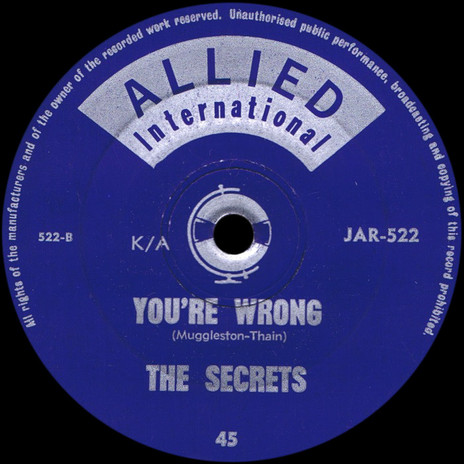
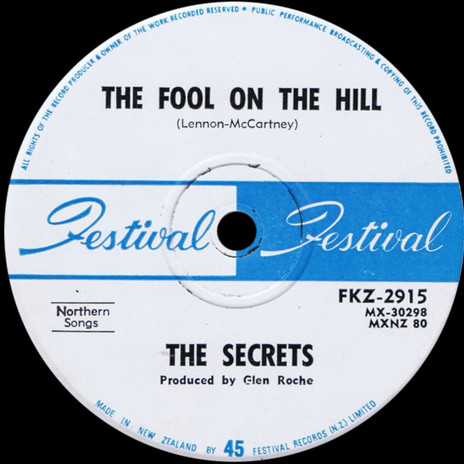
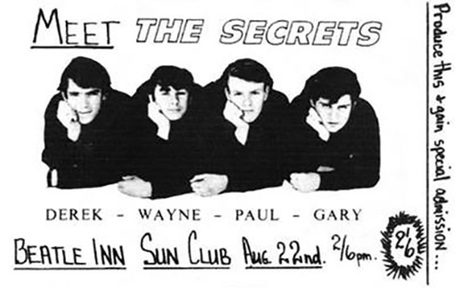
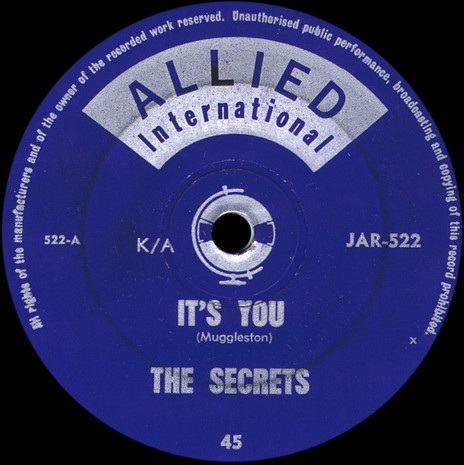
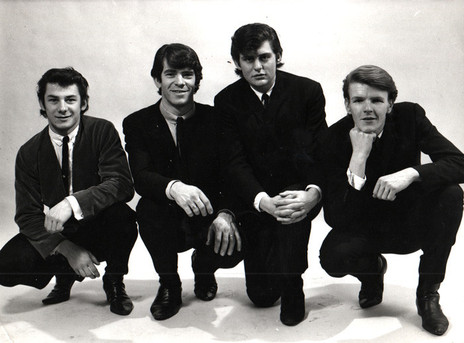

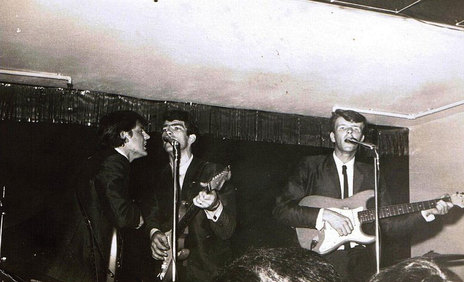
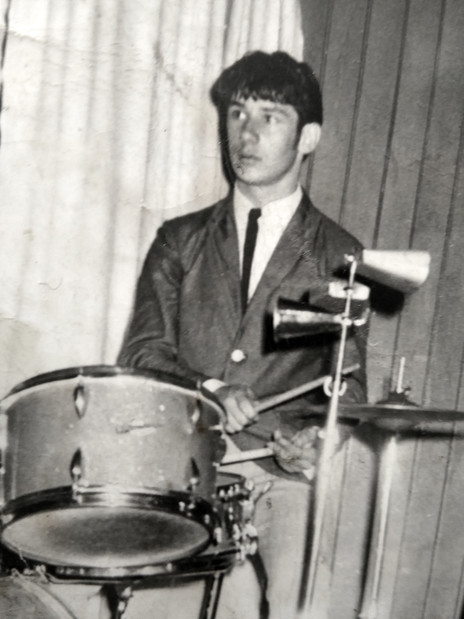
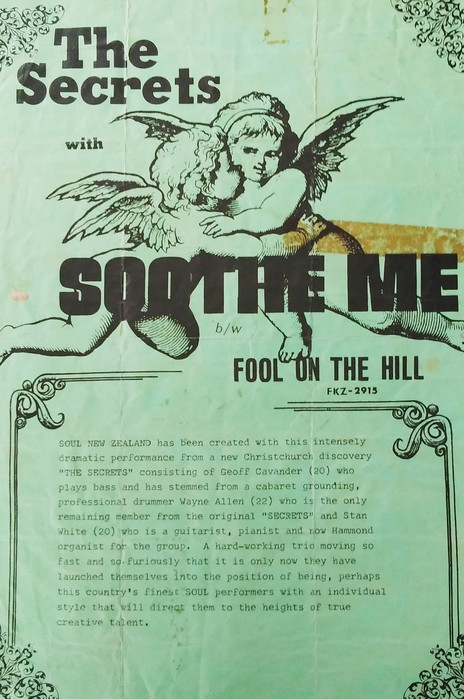
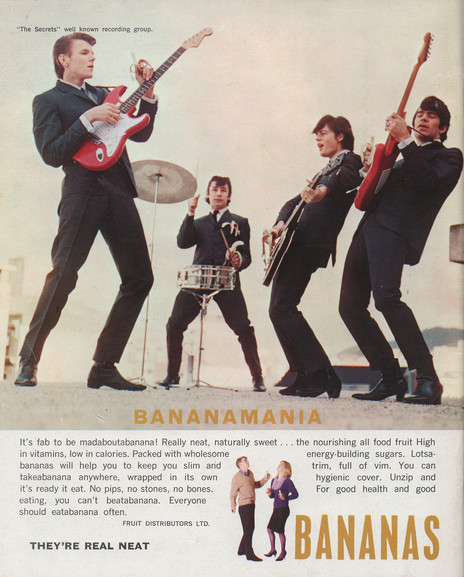
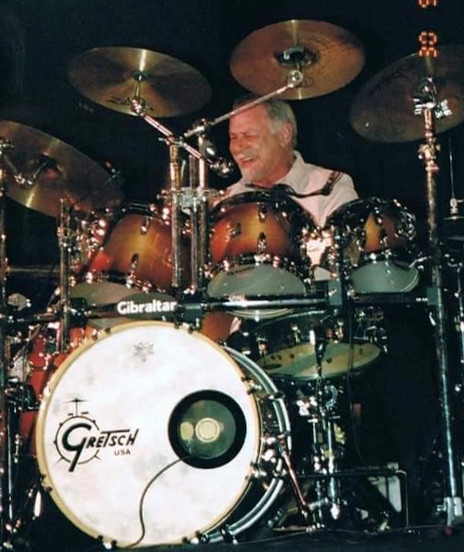
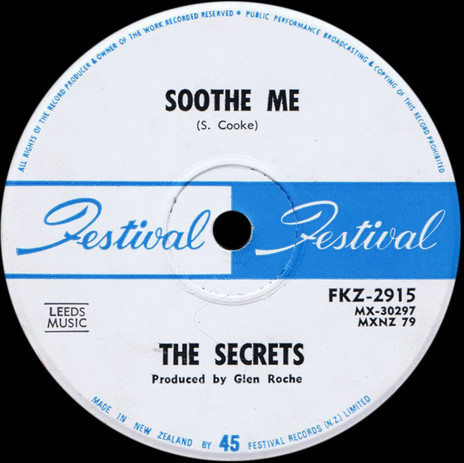
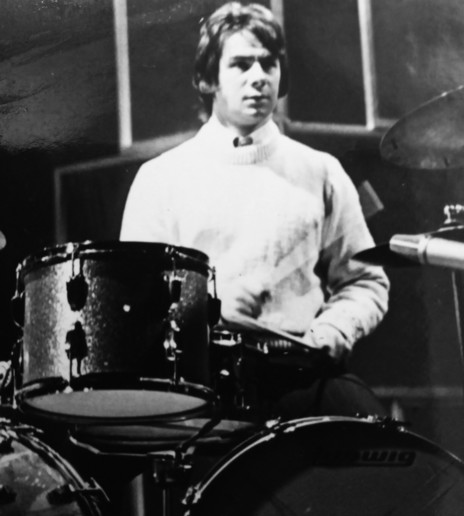
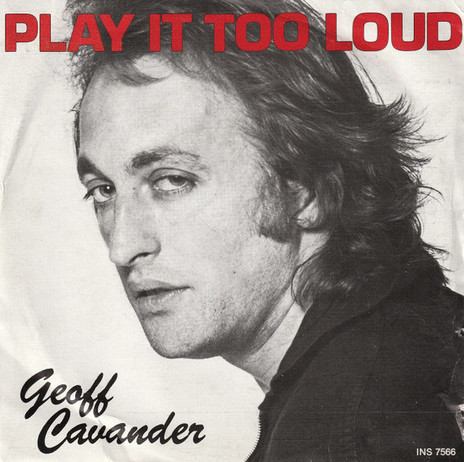
Geoff Cavander - vocals, bass
Stan White - keyboards
Wayne Allen - drums
Paul Muggleston - guitar
Robbie Carpenter - bass
Brian Dean - guitar
Derek Wright - guitar
Murray Wright - drums
Jimmy Deverill - keyboards
Harry Gilmore - keyboards
Kevin Taylor - bass
Chris Fox - drums
Visit our sister site
NZ On ScreenMade with funding from
NZ On Air